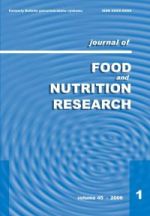Scientific journal
Journal of Food and Nutrition Research
Summary No. 1 / 2007
ŠTERN, P. - MÍKOVÁ, K. - POKORNÝ, J. - VALENTOVÁ, H.
Effect of oil content on the rheological and textural properties of mayonnaise
Journal of Food and Nutrition Research, 46, 2007, No. 1, s. 1-8
Petr Štern, Institute of Hydrodynamics, Academy of Sciences of the Czech Republic, Pod Paťankou 30/5, CZ-166 12 Prague 6, Czech Republic. E-mail: stern@ih.cas.cz
Summary: Two sets of mayonnaises with the oil content ranging from 66 to 82% and containing two different thickenings agents were analysed at 10 °C and 25 °C. The rheological analysis included the determination of flow curves, yield value, apparent viscosity, and viscoelastic parameters. Sensory characteristics were determined by manipulation of samples with a spoon, and in the mouth, testing the spreadability, and both texture and flavour acceptances were determined too. The oil content of a mayonnaise has substantial effect on rheological properties such as yield value, storage modulus and loss modulus, but no differences were observed due to the thickening agents. The pseudoplastic behaviour was confirmed. Temperature had no significant effect on the results of the sensory analysis. The effect of oil content on the viscosity perceived in the mouth and on spreadability was pronounced. The sensory acceptability increased with increasing oil content. Statistically significant relationships were observed between various rheological and sensory data, for instance between the yield value and the texture acceptability or between the storage modulus and the loss modulus and the spreadability. Rheological measurements were thus found useful for the rapid and cheap prediction of sensory texture, flavour and food acceptability of the product.
Keywords: mayonnaise; oil content; rheology; sensory characteristics; texture
Download:
(pdf, 412.51 Kb, 4273x)









